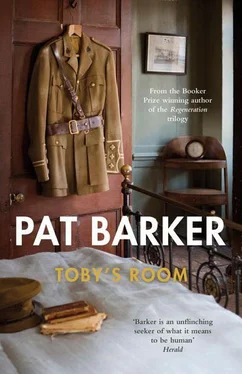All very primitive, nothing to do with us. But is it? I’m aware of something happening in me that I can’t explain. It’s almost as if I’m turning into Toby. It’s not just me thinking it either, other people have commented. As if you cope with loss by ingesting the dead person …
God, what a morbid thought. And it’s left me feeling rather doubtful about those paintings, the ones I did immediately after he died. It’s no use, I’ll have to go back and look at them again.
29 November 1917
First day back at the hospital. Woke up dreading it, butterflies with boots on all the way to Sidcup, but then, walking down the main corridor, I suddenly felt I belonged. Probably just because one or two of the patients stopped to say hello. There’s no doubt it makes a huge difference when you get to know the men as individuals, rather than just wounds and case histories. And I’m starting to do that now. There’s one chap, Maddison, used to play pool before the war, and he was really good, he used to play for his ‘beer money’ he said. Handed over his pay packet to his wife unopened — he was very proud of that — and all his spending money came from winning at pool. His wife and daughter came to see him three days ago — and he’d been looking forward to this visit — and dreading it — for weeks. And when the day came the little girl walked straight over to him and kissed him. I think I was almost as relieved as he was! Because you hear so many dreadful stories of children who just say flatly, ‘That’s not my daddy.’ Or run out of the room. He doesn’t think he’ll be able to play pool again though — his left eye’s so much lower than his right.
For some reason I keep thinking of Paul and Kit, the way they were when I first knew them. I think each of them felt at a disadvantage in comparison with the other, and in a way they were both right. Paul envied Kit that public-school self-confidence of his. It was very much a surface thing, Kit was anything but self-confident underneath, but it opens doors, that kind of thing, and I think Paul was very aware of it. On the other hand, Kit always looked like a sack of potatoes in his expensive suits, whereas Paul, in that ludicrously long, shabby, black overcoat he used to wear, looked like the Prince in Act Two, thinly disguised as a swineherd.
30 November 1917
One day good, the next … Yesterday, I really did think I was starting to get the hang of it. But today was my first day in the operating theatre. Scrubbing up reminded me of the Dissecting Room, same smells, same feel of rubber on the skin. Only difference is, the body we’re all clustering round can still feel pain.
It hadn’t occurred to me till I was actually there, surrounded by people in masks and gowns, that anaesthesia’s a major problem. The ether tube goes down the throat, but the surgeon’s always operating in the same area, and that makes things difficult, to say the least. Sometimes a patient comes round and they end up having to hold him down while the surgeon finishes off. Sometimes when they pull the tube out they spray ether in people’s faces and then you’re left with a groggy surgeon or a theatre sister who’s ceased to take any interest in the proceedings.
Tonks went in with me and stayed close the whole time. The first three operations were nose repairs. I don’t know whether that’s typical, I forgot to ask. Tonks has developed a standard system for recording nose operations, so provided I follow that I can’t go wrong. Well, that’s the theory, anyway.
I didn’t find it as hard as I thought I might. You’re not actually drawing; it’s more a question of taking notes. I had a few horrible minutes when my mind went completely blank, but after that I was all right. In fact, by the end of the morning I was almost euphoric because I hadn’t passed out, or done something else equally stupid. I hadn’t let Tonks down. That was what kept me going, really, the fear of letting Tonks down. I suppose beforehand I’d been dreading the sights, but I didn’t mind that so much, because I was so fascinated by the process. But the smells made me feel sick, after a while.
And then, just as we were starting to think about lunch, another patient was wheeled in, added to the list at the last minute. Tonks didn’t know; I’m sure he didn’t, he’d have warned me. Kit. I couldn’t see his face, it was his voice I recognized. I went across and looked down at him and his eyes widened. He seemed really startled, I couldn’t think why till I remembered the mask I was wearing, and of course he wouldn’t be expecting to see me there, anyway. But it was a nasty moment.
2 December 1917
Catherine and I don’t get on as well as we used to do and in a flat this size that really matters.
Of course it’s not bad all the time. Sometimes in the evening when we’re sitting by the fire in our nightgowns it’s exactly the way it used to be. But we talk too much about old times. We’re living off the past because, in the present, there are just too many things that can’t be mentioned. I think she’s attracted to Paul, I know he’s attracted to her, and I can’t work out what I feel about it. A few weeks ago I’d have said it wouldn’t matter if Paul found somebody else. Now, I’m not so sure. For one thing, I never thought the ‘somebody else’ would be my best friend. And part of me thinks he’s attracted to her for that very reason. He almost said as much.
They’d suit each other, probably. Paul needs somebody who’ll put his work first, deal with the domestic side so he doesn’t have to think about it, believe in his talent, forget about her own. Catherine’s got talent, but she’s not ambitious. She’d slot into that role perfectly well — and it’d kill me. I don’t blame Paul for wanting it. I know if somebody offered me that kind of support I’d jump at it, but I don’t think women are offered it, not very often anyway.
So I go round and round in circles. A lot of this is because I’m not painting. I’m never any good when I’m not painting, but you need some stability to be able to do it, and I haven’t got that. Probably I should just focus on finding a place of my own. Forget everything else.
You had to lie on a stretcher to be taken to the operating theatre. He hated that: the helplessness. Why not let him walk while he still could? But no, you had to be turned into an object to be fetched and carried because that helped the people who were going to slice into you. He lay, fuming, staring at the ceiling of the hut, shut off from the voices around him. ‘Good luck,’ somebody called out. He raised his hand in acknowledgement, but didn’t turn his head.
Outside, a brisk wind blew a mist of fine rain on to exposed areas of skin. They trundled him along, wheels squeaking and hissing on the wet walkway. Familiar smells of creosote and starched linen. A nurse, her face screwed up against the rain, marched along beside him, sensible shoes clumping on the boards.
Boots thump-thumping on duckboards, the misery of wet clothes. If he closed his eyes, he might be back there. What a luxury a wheeled stretcher would have been … By the time they’d finished carrying the wounded back he’d felt as though his arms had been wrenched out of their sockets; he was trailing his knuckles along the ground like a baboon. The nurse’s hair was stringy with wet. He raised his hand to his face and touched a crater that no amount of rainwater would fill.
A blast of heat as the swing doors burst open. Bright light, his eyes hurt, he’s afraid now, horribly afraid, then Gillies’s eyes above the mask, crinkled at the corners, he must be smiling. ‘It’s all right,’ he says. ‘It’s all right.’ A long struggle to get the ether tube down his throat, he’s choking, gagging. It’s Brooke’s eyes now above the mask. Enormous eyes, that curious pale translucent blue, Elinor’s eyes. It could be Elinor standing there. But it’s Brooke’s voice he hears. ‘You did this to yourself, didn’t you?’
Читать дальше












